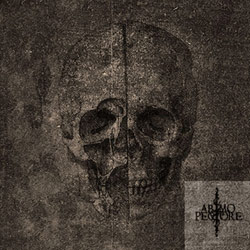
The Dissociative Path
Debemur Morti
Arty, post–black metal seems to be the hip thing to do nowadays, and with the artistic and critical success of bands like Blut Aus Nord, it’s not surprising. Portugal’s Ab Imo Pectore (Latin for “from the deepest chest”) is a band who’s jumped on this bandwagon with The Dissociative Path, which for all intents and purposes is a cassette demo now available in digital format. Well, no matter the format, the EP is an unpleasant, noisy mess of avant-metal madness. As far as musical chops go, Ab Imo Pectore is a little on the sloppy side. Their bleak, minor-key guitar picking and rickety drum rhythms often sound disjointed, which may or may not be intentional. But when the band picks up the pace and puts some juice into the guitars, it turns into a whirlwind of fury that occasionally threatens to be uncontrollable. The vocals are easily the most striking element of The Dissociative Path, with layers of distorted rasps, bellows and moans intersecting to create a disturbing excursion into psychological darkness.
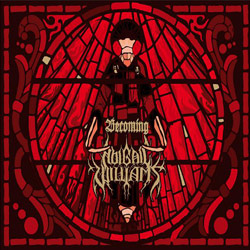
Becoming
Candlelight
Los Angeles–based Abigail Williams is another band that gets bashed by metal elitists the world over for reasons I simply cannot fathom. Granted they are not the most original band; their debut, 2008’s In the Shadow of a Thousand Suns, while a satisfying listen, reeked of Emperor worship, and its successor, In the Absence of Light, was bland by-the-numbers black metal. Still its a pity that most metal snobs won’t give Becoming, Abigail Williams’ third record, a chance, as it’s a gripping slab of stark sounds occasionally enhanced by string acoutrements. The album is brimming with fierce tremolo picking and the biting shrieks of mastermind Ken Sorceron, while the strings often lead the melodic passages of the record’s six epic tracks. Such extracurricular elements feel very natural and there’s only a select few moments within these long songs that things become bogged down. The mood of the record is in constant flux, shifting between being slow and introspective to roaring flurries of slashing guitars and blastbeats. And unlike the band’s past releases, Becoming feels like a complete musical thought rather than a collection of songs cobbled together. Another thing that stands out is the in-the-red production. Such rawness only enhances the ambiance of the album, and Becoming sounds like the band has finally forged an identity for itself.
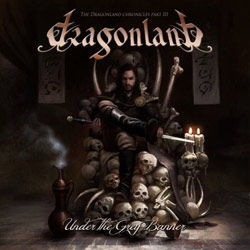
Under the Grey Banner
AFM
I have a love-hate relationship with most symphonic metal. In many ways, I love the over-the-top presentation, but the the musical theatre element ends up being a turnoff more often than not. Dragonland possesses such theatrical attributes, but for the most part the Swedish sextet manages to keep things enjoyable on their fifth full-length, Under the Grey Banner. The vocals of Jonas Heidgert tend to be the most dominant melodic element throughout the record. Though try as he may, Heidgert only comes within a stadium-length of the power and range of Bruce Dickinson, he still is one of Dragonland’s best assets. The band knows how to write big, anthemic choruses, and the majority of Under the Grey Banner shows off this arsenal. Dragonland isn’t afraid of incorporating aspects of Celtic folk music, and paired with the requisite use of piano, strings and horns, this strain of symphonic metal shows a lot of creativity and keeps things interesting throughout. Dragonland’s lyrics are ensconced in a fantastical world, and the album unfolds like a fairytale. Ultimately, Under the Grey Banner is geared towards those who enjoy metal, larping and D&D. Needless to say, your mileage may vary..
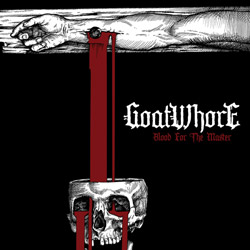
Blood for the Master
Metalblade
Blood for the Master is the fifth full-length platter from New Orleans metal maniacs Goatwhore and is quite possibly their most satisfying record to date. Really, there’s plentry to like about Blood for the Master. It’s well-produced, violent, and thrashy—the kind of album that will surely get the pit moving in the live setting. L. Ben Fagoust’s throat-straining, pre-puking snarl is perfectly suited for this brand of machine-gun metal. Lyrically, Goatwhore keeps things simple with tunes about Satan, evil, apocalypse, death... the usual suspects, but who cares? Blood for the Master is 38 minutes of nonstop headbanging that is catchy as fuck and a damn fun listen.
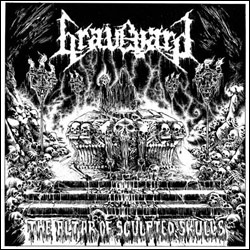
The Altar of Sculpted Skulls
Pulverised
There’s like 20 million bands named Graveyard, but this particular one hails from Spain and formed in 2007. The Spanish quartet’s new EP, The Altar of Sculpted Skulls, sounds like it could have been made in the late ’80s or early ’90s as these six songs are steeped in an old-school death metal brew of churning grooves, flesh-rotting guitar chords, pounding drums with D-beat tendencies, and bellowing growls straight from the guts of death. Believe it or not, there’s also a lot of melody here and the production is pretty clean. Still it’s raw were it counts, and along with the very ’80s looking cover, Graveyard’s nostalgia factor wins points in this old schooler’s heart. I wish more modern death metal was like this, as Graveyard hits the nail on the head in heavy fashion.
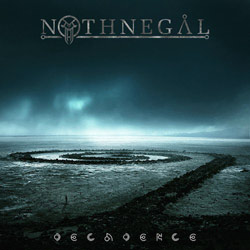
Decadence
Season of Mist
It never ceases to amaze me how global metal is. Forward-thinking sounds can come from the most unexpected places, and that’s certainly the case with Nothnegal, a band that hails from the small and remote Asian country of Maldives. The band’s first full length, Decadence, answers the musical question of, “What would death metal sound like if it was the soundtrack to a sci-fi movie?” A 40-minute slab of cyber-death is apparently the answer. At Nothnegal’s core is solid musicianship, and the band’s performance is grooved out and fluid; the music flows smooth like a running stream of water. Lead singer Affan sings with a strained rasp, but it’s one of those rare instances that a listener can understand the words on a death metal reviewer. But what really stands out are the light, airy keyboards that permeate Decadence. The juxtaposition of the clinical death metal foundation with the cybertastic keys give Nothnegal’s music a futuristic feel, which if nothing else is intriguing and hints at the creative ways for this band to evolve.
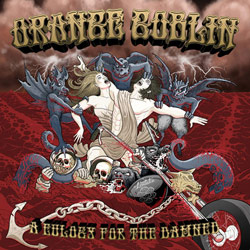
A Eulogy for the Damned
Candlelight
Orange Goblin’s albums have always had a handful of tracks that rocked my socks off, but no one record has ever been consistently excellent. As such, they were mostly a serviceable stoner-rock band and not much else. However, A Eulogy for the Damned, the band’s first full-length in five years is an impressive new set of songs. Sure, there’s the fist-pumping anthems (“Red Tide Rising,” “The Filthy and the Few”) with which Goblin fans are familiar and will gobble up with glee, as well as bluesy ’70s-styled hard rock (“Acid Trial”, “Return to Mars”). But there’s also more introspective fare(“Stand for Something,” “Save Me from Myself”) that add unexpected color and dimension to the band both lyrically and musically. A Eulogy for the Damned should earn the British quartet some new fans as well as satiate the Orange Goblin faithful.
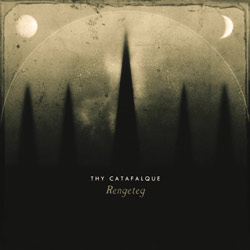
Rengeteg
Season of Mist
Jesus, where do I begin with this one? One-man Hungarian metal project Thy Catafalque is musically all over the board with the sounds that run through fifth full-length Rengeteg. Just the thought of trying to attach them to any one musical style or sub-genre makes my head spin like Regan in The Exorcist. The first three tunes are characterized by distorted melodies carried not just by the guitars but by the varied vocal techniques of main-man Tamas Katai. Throughout Rengeteg, Katai’s vocals fluctuate between a clean high and low register, but he also isn’t afraid to throw in some nasty, distorted growls. Such variety of approaches is one of the most intriguing components of the album, but that’s really just the beginning. Elsewhere, the record is dominated by electronic elements, and if that wasn’t enough, Thy Catafalque adds spoken word samples, ambient noise, drum machine beats and other elements of trip-hop to its musical stew. Hauntingly memorable melodies help hold it all together. There’s just so much going on here, there has to be something to capture an adventurous listener’s imagination, and Rengeteg is easily one of the best listens of 2012.
Gary Spencer
EXTREMITIES
